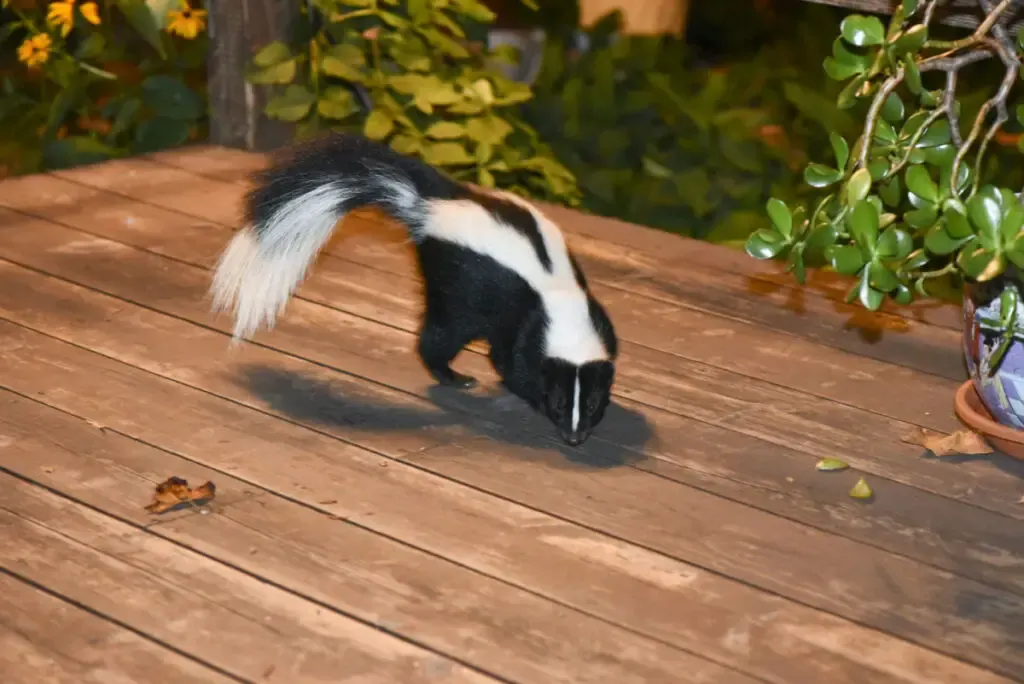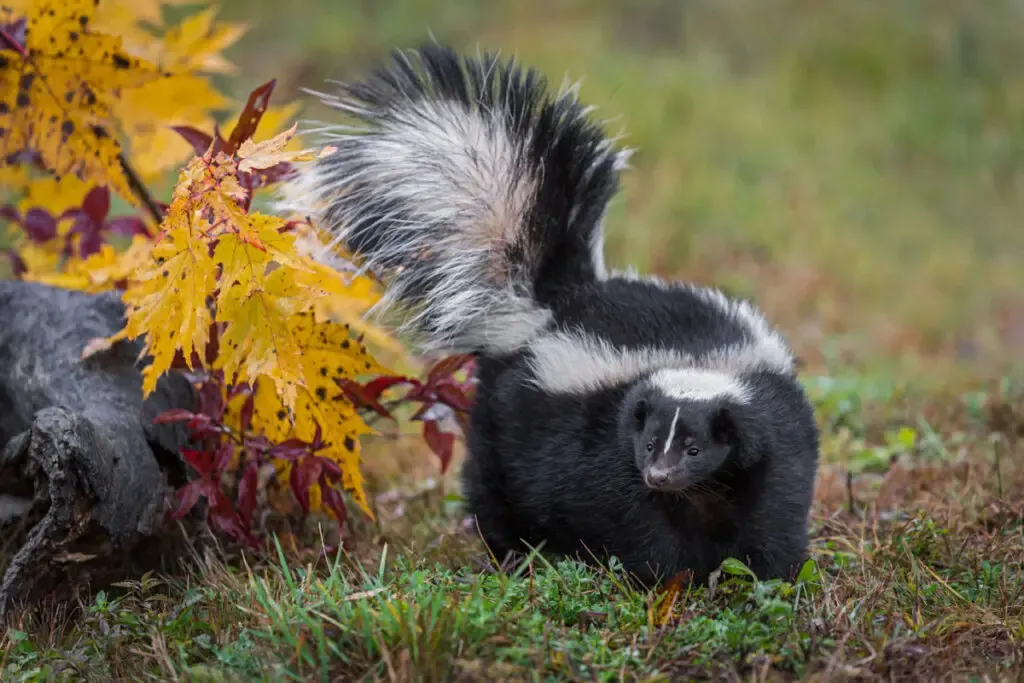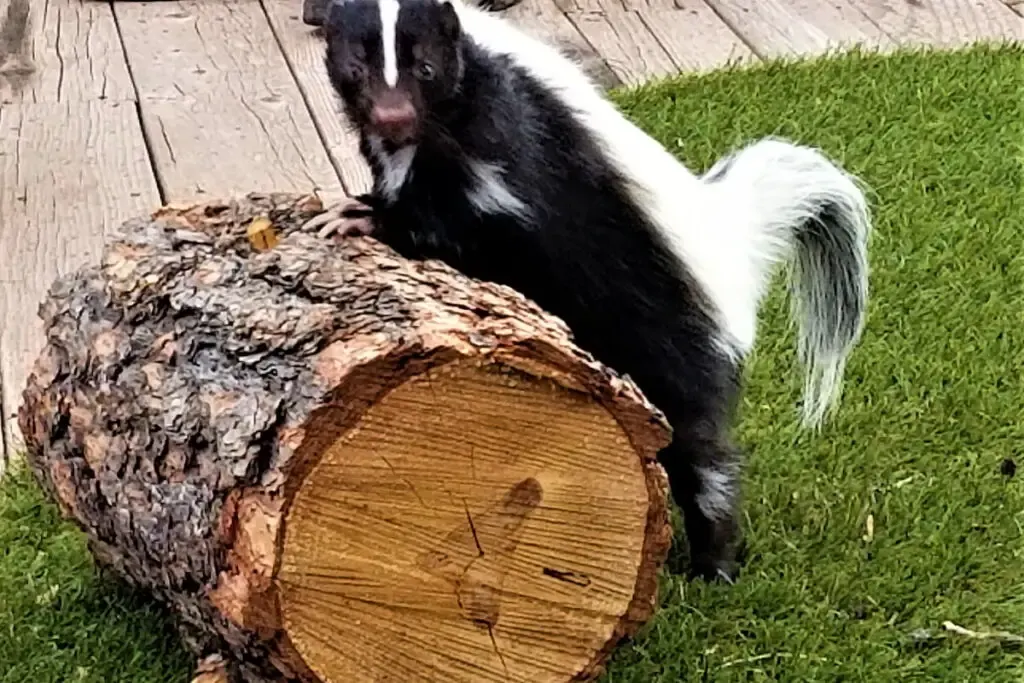If you live around a place where many skunks roam, there is a chance you will smell skunk spray almost every night. Regular exposure to such an unpleasant smell is sure to become really irritating. But apart from that, it might leave you asking questions like, “why do skunks spray every night?”
So, why do skunks spray every night?
Well, skunks don’t necessarily spray every night. But because they are nocturnal, they are more likely to spray at night.
In other words, skunks are awake and active at night. Therefore, their risk of exposure to potential predators and threats at night is higher. As a result, their likelihood to spray is also higher at night.

There is more to know about the idea that skunks spray every night. If you read this article to the end, we further explain why it seems like skunks spray every night. We also discuss some other interesting things to know about skunks and skunk spray.
Table of Contents
When Do Skunks Spray?
Generally, animals are at higher risk of exposure to predators when they are awake and active. Being nocturnal animals, skunks are awake and active at night. So, they are more likely to come across predators and threats at night. And when they do encounter predators/threats, they will spray.
You are more likely to smell skunk spray at night in spring and fall than any other period. Spring is mating season for skunks, so they are more active.
In fall, skunks perceive the drop in temperature, so they start preparing for torpor through winter. Apart from that, the kits born in spring start going out with their parents to learn to forage during fall. So, there will be more skunks roaming around for sure. More roaming equals higher activity.
More activity means a higher risk of encountering predators and threats. Consequently, the likelihood of skunks spraying will increase.
Interesting Things to Know About Skunk Spray
Skunks Do a Warning Dance Before They Spray Their Targets
Before a skunk actually sprays, it does a complex dance to warn and ward off the assailant. This dance typically involves the skunk growling, shaking its tail, fluffing its fur, spitting, and stamping the ground. For spotted skunks, this dance looks like an awkward hand-stand dance.
Skunks avoid spraying as the first line of defense because they enter a refractory period after spraying a few times. In other words, after spraying up to 6 times, it could take up to 10 to 14 days before they can spray again. So, if they spray needlessly, they could be helpless until they can spray again.
A Skunk’s Stripes Point to Its Sprayer
Skunk stripes run all the way across their backs, leading to the point they spray from. So, if you have always thought those stripes point to the sprayer, you are correct.
Some researchers believe the stripes may help intimidate predators without actually spraying them. Since the stripes already show the skunks can spray, the attacker may stay away. As a result, the skunk wouldn’t have to spray.

Skunk Spray Can Catch Fire Easily
Skunk spray is flammable. Obviously, the flammability is not a part of a skunk’s defense mechanism. But some of the sulfur compounds that make up the spray are inherently flammable.
Some People Cannot Perceive the Smell of a Skunk
Yes, some lucky people in this world cannot perceive the stench of a skunk. The inability to smell skunk spray stems from a condition known as specific anosmia. Interestingly, the condition is pretty common as 1 in 1000 cannot smell skunk spray.
Skunks Use Spray as a Deterrent Because They Are Nocturnal
Skunks evolved to use their spray as a deterrent because they are nocturnal.
Animals like meerkats, which are strictly diurnal, are at higher risk of attacks by birds of prey. They are also at risk of attacks from land animals like jackals and snakes. So, how do they defend themselves? They rely on their numbers.
To defend themselves, meerkats have some individuals looking out for threats, some watching the babies, and some foraging and frolicking. And if there is an attack, they gang up on the predator or stir dust up and hide.
The defense system of animals like meerkats will not work for skunks because skunks are nocturnal. Visibility is severely limited at night, so having skunks be on the lookout would be ineffective.
Besides, since it’s nighttime, the chances of birds attacking them at night are pretty low. So, they only have to worry about terrestrial predators, and spraying is pretty effective against such animals.
Skunks Belong to a Family Named After Their Prime Feature

When people think of skunks, the first feature that comes to their mind is stench/spray. Skunks belong to a family called Mephitidae. As you may have guessed, Mephitidae means “stink.”
At a point, skunks were in the Mustelidae group alongside weasels, badgers, and otters. But DNA sequencing studies revealed that skunks came from a single common ancestor.
A Skunk’s Spray Travels Pretty Far
The power of a skunk’s spray is not only in its stench; it travels pretty far too. When a skunk releases its spray, the chemical can reach as far as 10 feet from the sprayer.
Apart from that, you might be able to smell them from as far as 1.5 miles away. This means even if you are not close to the skunk that sprayed, you can suffer the irritation too.
Skunk’s Spray Can Linger for Weeks
Besides traveling far, skunk spray does not disappear quickly. If you get sprayed by a skunk, the odor will linger for days or even weeks.
Skunks Have Two Anal Glands
Skunks have two anal glands, and they can spray from each one. However, these glands only contain a limited amount of skunk spray. This is why skunks can only release around 6 successive sprays.

Other Interesting Things to Know About Skunks
Skunks Are Immune to Snake Venom
If a venomous snake bites a skunk, the skunk will not die. This is possible because skunks are immune to snake venom just like pigs, possums, and mongooses.
Skunks Are Opportunistic Feeders
Skunks have a flexible diet; they eat various types of foods. Thankfully for them, they are omnivores too. So, they can eat virtually anything from plant matter to animal matter.
Skunks Have Poor Vision
Skunks do not see well; their eyesight is poor, and this may be one reason they are nocturnal. Fortunately for them, their senses of smelling and hearing are pretty good. So, these complement their poor vision.
Final Thoughts
Skunks do not spray every night. However, because they are nocturnal, they are more likely to encounter threats and predators at night. So, more times than not, they will spray at night.
Resources
- https://pestpointers.com/what-does-it-mean-when-you-smell-skunk-at-night/
- https://animalremover.com/skunk-problem-animal-remover-discusses-why-skunks-are-active-in-september-and-how-to-get-rid-of-that-smell
- https://spectrumlocalnews.com/nys/central-ny/weather/2021/03/22/where-have-skunks-been-all-winter-
- https://www.cell.com/current-biology/pdf/S0960-9822(07)01149-9.pdf
- https://animalfactguide.com/animal-facts/meerkat/
- https://www.quora.com/How-do-meerkats-defend-themselves
- https://www.nationalgeographic.org/media/meerkat-survival-tactics/
- https://weilerwoodsforwildlife.com/skunk-spray
- https://faunafacts.com/snakes/animals-immune-to-snake-venom
- https://www.nationalgeographic.com/animals/mammals/facts/striped-skunk

